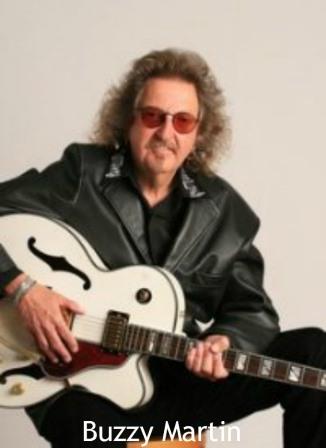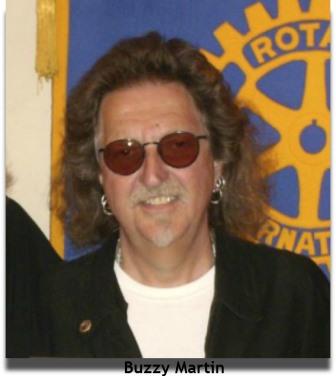
| |||||
|
|
|
After three times of going through the Seger song, it begins to take shape. I have each student sing a verse, and then, everyone sings the chorus. Just then, yet another inmate tells me he plays bass guitar. Without saying another word, he picks up the guitar. We all sit listening…with our mouths hanging open while he plays the bass lines of the Tower of Power song "What Is Hip?” note for note.
My first thought is, "I would like to be in a band with this guy.”
The problem? He is an inmate in San Quentin State Prison…
Behind the walls of the Q, author of Penguin Books "Don't Shoot! I'm The Guitar Man”, musician Buzzy Martin gives a telling portrait of the transformative power of music. For three-and-a-half years, this musician visited weekly without judgment, but took with him honesty, sympathy and a candor he also uses while teaching music to at-risk kids.
His motto? Educate-not-Incarcerate!
"There is a kind of smell in prison that the inmates give off. It's a strong scent of cheap food and sweat. I could cut it with a knife,” Martin says.
And there are rules.
Rule number one: No denim, blue or red.
There goes the blue jeans!
Rule number two: No running. Shoot first, ask questions later.
Walk this way from now on!
Rule number three: Picture ID at all times.
Hell yeah!
Rule number four: NO HOSTAGE IS RECOGNIZED.
What the f—k?
And don't call an officer a guard. Guards work for Kmart or Walmart.
Get the picture? Not for the weak-hearted, but the kind of challenge Martin was willing to take to change the world one beat at a time. Martin's dedication reaffirms music is not only the universal language but necessary.
Born and raised in Grand Rapids, Michigan, Martin taught himself how to play guitar and piano at thirteen years of age. By fifteen, he was performing in his first band. In the summer of 1979, Martin moved to Northern California. His goal was to secure a record contract like most other singer/guitar players who write their own songs.
Never landed a record deal.
But during the 70s and 80s "the primary goal of the corporate rock artist or band in making music was profit and radio airplay rather than artistic creativity.” By the mid-seventies it was clear that despite a brief underground period, music had become an entirely different business. Radio's ultimate goal was based on Arbitron ratings. Broadcasters prized familiarity. Record companies sent promo guys with cocaine to open doors. No single artist stood much of a chance.
So Martin met a woman, married and started a family. He still played music, still knew he had been sent West with reason. He began teaching music to at-risk youth who had been abused, neglected or in trouble with the law. Then in 1996, he was asked if he wanted the same kind of gig at the Q at fifty bucks for an hour once a week. Martin's reply? "Are you nuts?”
Before long, he went from teaching one class a day to eighteen classes a week. Corporate record companies would have had a hard time with such a marketing strategy. Even Fleetwood Mac had trouble selling "BellaDonna” as one word because of its drug reference, so they changed to two words which in Italian means "beautiful lady”. Bonnie Raitt had been hard to sell at thirty-seven years old to a major label. So Capital Records, want a singer/guitar player who spends his time in the Q's H-Unit or North Block (The Hill) teaching behind double fences with barbed wire on all sides and gun coverage all the way around? Could the promo guy lay out a line of coke and start pitching a song by an artist who hangs in the land of forgotten souls?
Maybe, but Martin's fate at the time shouted otherwise.
"Never say never. Getting inside H-Unit takes a little longer. (H-Unit houses more violent inmates in steel cages.) After waiting for what seems like an hour, I am given the go-ahead to be cleared and let inside H-Unit. My escort tells me nothing has changed in H-Unit. The freaks still bark at the moon and bitch about everything in sight. As soon as the officers and I start walking through the yard, the catcalls start right away, 'Hey, rock star,' 'Hey, John, where's Paul?' 'Do you know how to play any Motown, pretty boy?' "
"After roll call, I have six inmates, all ready to learn some songs," Martin says. "In the middle of the class, one of the inmates shares his story about his childhood." He had tried to learn to play guitar. But he had to hide in the closet, door shut, so his drunken father wouldn't hear. The sound triggered something bad in his father that caused him to go crazy and beat the kid up.
"Celebrating Christmas in prison has to be hard on inmates and their families," Martin says. That particular Christmas in H-Unit, Martin entered the officer's main post. A big sign hanging on the captain's office window read "I can only please one person per day. Today is not your day, and tomorrow does not look good either."
Merry Christmas!
And in one class at H-Unit, an inmate stopped playing his guitar to say, "Buzzy, there's a couple inmates in H-Unit that have a sex fetish for other inmates. They love the smell of a man's ass. I kid you not, Buzzy! The scent drives these fuckin' sugar shorts nuts."
Before class was over, another inmate chimed in, probably in reaction to Martin's pallor. "Buzzy, are you going to throw up?”
"Welcome to H-Unit, my friend.”
All the inmates were testing Martin, seeing if he'd react, just like the kids in juvenile hall he taught. "Walking back across the main yard,” Martin says, "I think about what the inmates in class had said about some old crusty cons sucking on an inmate's neck while laughing and jerking themselves off. I sometimes hate this place because of what it does to some men."
Martin preferred entering the Q when it was cold and foggy. "Being locked up in a cage while birds are flying and singing all around me as I watch the sunset on the bay from behind bars is very strange." Then Martin would head out to his truck, sit and record what happened in class on a tape recorder so he'd never forget.
After all the guitar notes picked from Merle Haggard to ZZ Top, Stones, Elvis, Eric Clapton's "Before you Accuse Me (Take a Look at Yourself)", to "Santa Claus is Coming to Town", Martin finally had found his spot in the Q's pecking order.
"Over the prison speakers I hear, 'Music class will begin in ten minutes. The Guitar Man is now in the house'," Martin says. "If I am ever caught in the middle of a lockdown, I think my best bet is to drop down to my knees, shouting at the top of my lungs, 'Please don't shoot me! I'm the Guitar Man'."
"Peaceful Easy Feeling”, "Runaway", "Who'll Stop the Rain?” and "just give me some of that ol' time rock'n'roll…” Gutter rats, druggies, rapists, murderers, gang fighting, stabbings, like a bunch of monkeys in a cage, wild and street-wise, Martin taught them one song at a time. Shaking with his hands on the steering wheel when he'd leave after the officer would announce class was over with a mocking, "Later girls", Martin never failed to return. Until the final class, maybe before some "Freebird" or 'Mustang Sally", while he was unpacking his guitar, Martin heard an inmate say, "Are you and Marco still playing music together? Are you still living in the same house in the same town? How are your wife and son doing?"
Red Flag with a class ready to rock'n'roll, but the gig was over. Knowing the name Marco meant the inmate knew too much. Martin didn't plan it, but the time had come for him to stop. No more drives, smelling the salty bay or hearing the sweet cries from the gulls along the east gate wall where he'd park. The bay on the left. San Quentin on the right full of dead souls no one gave a shit about.
But Martin did and tells us his story in vivid detail in his book-turned-movie by Prodigy Entertainment starring Eric Roberts as Martin, directed by Rocky Capella, produced by Ray Robinson, Executive Producer Patti Solomon, screenplay by Laurie Lamson with featured appearances by Martin, Arielle (After The Storm), Legendary Blues Performer Charlie Musselwhite and Rappin 4'Tay (Dangerous Minds). Martin is currently in the studio finishing songs for the movie, "Don't Shoot! I'm The Guitar Man".
Martin says, "There's a scene in the movie where I walk down the hall and pass a Christmas tree. The music in the background is the first of the prison songs, "I'll Be Coming Home for Christmas Mama'." He's also playing solo around Northern California clubs singing his prison songs for former inmates, a lot being former veterans suffering from PTSD. Some guy will come up to Martin and ask him about his doing time, how he captures everything down to the smell and Martin answers, "But I got to go home at night."
"Don't Shoot! I'm The Guitar Man" has been translated into German. A recent interviewer asked him why in the US do we lock people up or why we kill people for killing people? Because of their inability to comprehend the American Justice System, the German translation meant changing the cover to match their sensibilities. Martin said, "There are roughly 2.7 million incarcerated and around forty to fifty-million families who live with the stigma every day."
What do you find behind those walls?
The day my band performed in prison along with inmates' bands, "we were told the first inmate band members were lifers.” We walked back to the van, shell-shocked.
"What's up with that?" our six-foot-seven, two-hundred pound-plus roadie asked about the sexy chicks he had passed.
"Hey I hate to be the one to break the bad news to ya, but those chicks that were hitting on you are guy inmates. That's what's up with that, my good friend." Martin knew the Q.
"Holy shit,” one of the other band members said as we drove home. "Let's go have a beer."
"I tell him when we get back to the house, let's have two beers each!"
As producer Ray Robinson puts it, "How sweet the air we breathe…when we breathe as free
men."
|
|
|

